
12 August 2024
Markets have had a health scare – call the doctor! Or better, call three of them (Dr Yield-Curve, Dr Credit-Spread and Dr Sahm) who are often used to diagnose recessions. The US economy could disappoint overly-optimistic market expectations from mid-2024, with growth dropping below trend, which requires close monitoring.
Economists have tended to focus on fundamental triggers for the market tantrum. But technical forces – especially the unwinding of carry and dispersion trades – have amplified the bad macro news, creating a major volatility (VIX) shock in markets.
A backdrop of elevated rates and economic uncertainty has been challenging for the private equity asset class in recent years. The prospect of a lower rate environment could help private equity dealmaking to bounce back.
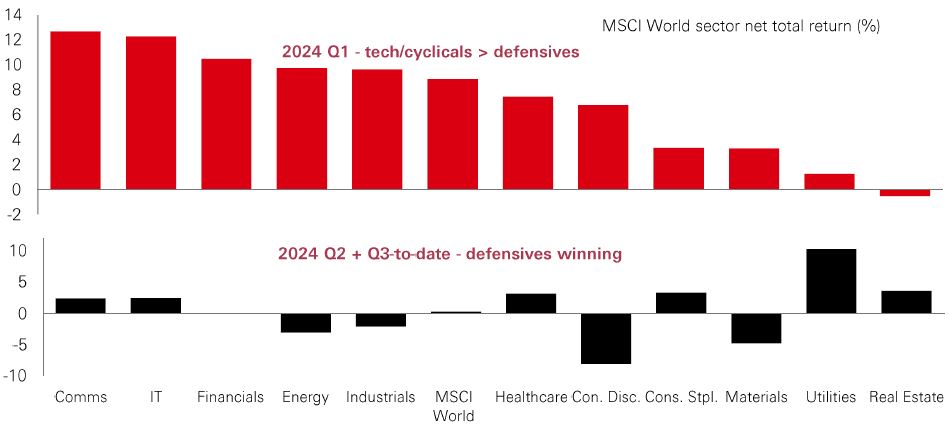
Last week started with rapid drawdowns in many global equity indices, and some historic daily moves in Japan – both down and up. The VIX spiked to above 60 on Monday, a level last seen in the Covid market crisis of March 2020. And while markets regained their composure later in the week – the VIX fell back below 30 and the S&P 500 stabilised – there is still major uncertainty on how developments might pan out in the coming weeks.
As the recession risks are now clearly higher than anticipated only a few weeks ago, we need to consider the potential for “negative feedback loops” stemming from recent market action, which can dampen business and consumer confidence. With valuations in pockets of the risk asset universe still looking stretched (mega-cap tech, global high-yield credits) we think it makes sense to be cautious.
Meanwhile, defensive parts of the stock market (consumer staples, healthcare, and utilities) could be safe harbours. And real estate – although cyclically sensitive – is helped by falling rate expectations. With uncertainty still high, defensives remain in focus.
Last week’s sell-off in global risk assets had a mixed impact on emerging markets across Asia. Much of the pain was felt in trade-dependent economies like Taiwan and South Korea, where in-demand sectors like semiconductors are sensitive to a slowdown in US growth. The region’s chipmakers have surprised to the upside on earnings this reporting season, suggesting still-solid demand for chips. Yet July’s US tech sell-off had already had a chilling effect on stock prices. From year-highs in mid-July, Korea’s Kospi index was down as much as 16% amid the volatility.
Mainland Chinese stocks have been under pressure all summer but held up better than most last week. In part that was because its stocks have relatively low overseas exposure versus global peers. There are also signs that analysts are feeling more optimistic about them, with 12-month forecast earnings picking up since early Q2. And in India, stocks experienced only mild drawdowns, outperforming regional peers despite relatively rich valuations. That was helped by recent earnings trends that have been broadly in line with expectations.
The value of investments and any income from them can go down as well as up and investors may not get back the amount originally invested. Past performance does not predict future returns. The level of yield is not guaranteed and may rise or fall in the future.
This information shouldn't be considered as a recommendation to buy or sell specific sector/stocks mentioned. Any views expressed were held at the time of preparation and are subject to change without notice. While any forecast, projection or target where provided is indicative only and not guaranteed in any way.
Source: HSBC Asset Management. Macrobond, Bloomberg. Data as at 11.00am UK time 09 August 2024.
Markets have had a health scare – call the doctor! Or better, call three of them (Dr Yield-Curve, Dr Credit-Spread and Dr Sahm) who are often used to diagnose recessions.
What do these doctors say? First, the yield curve is dis-inverting via a ‘bull steepening’ (i.e. short-term interest are rates falling faster than long rates). Second, credit spreads are now rising, although not quite yet to historically concerning levels. Finally, on the real-economy side, the Sahm rule, which tracks the change in the unemployment rate, has breached a key threshold after July’s bad labour market data. While several special factors – including Hurricane Beryl – could have temporarily boosted unemployment, a wide range of labour indicators highlight the jobs market is cooling.
The US economy could disappoint overly-optimistic market expectations from mid-2024, with growth dropping below trend, which requires close monitoring.
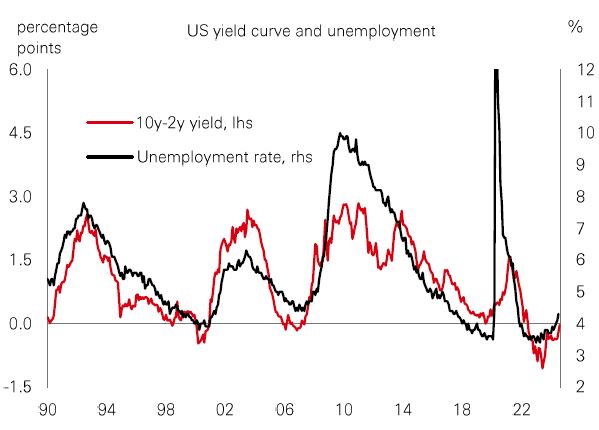
Economists have tended to focus on fundamental triggers for the market tantrum. But technical forces – especially the unwinding of carry and dispersion trades – have amplified the bad macro news, creating a major volatility (VIX) shock in markets.
Carry trades need a cheap funding currency to sell (e.g. yen) and high-yielding currencies to own (e.g. Mexico). While volatility stays low, you can pocket the rate differential. Dispersion trades sell volatility on an index (e.g. S&P 500) and buy volatility on index constituents. While correlations are low, profits follow.
But crisis dynamics weed out leveraged players. Bad macro news and rising volatility began an unwinding of these trades, and soon enough it was a cascade, amplifying volatility. In the last week, we had a vicious cycle as the risk averse are forced sellers.
What breaks the cycle? Some market stability helps. Evidence shows that most of the yen ‘excess shorts’ are now unwound. And last week’s BoJ-speak has been dovish. Meanwhile, lower numbers on the VIX and VVIX indices are welcome news. But, ultimately, global markets will remain sensitive to the US economic data-flow.
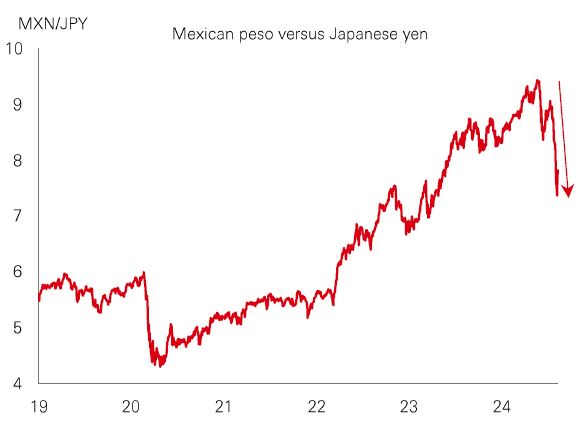
A backdrop of elevated rates and economic uncertainty has been challenging for the private equity asset class in recent years. Higher borrowing costs and a difficult environment to sell investments has meant that private equity investors have put more in (via capital calls by funds) and got back less (in distributions) – resulting in negative cash flows since 2023.
It’s a marked change from 2021, when cashflows were positive. Back then, cash calls grew on a boom in post-Covid dealmaking, and distributions back to investors surged to a high watermark of almost USD 750bn – up from USD 462bn in 2020.
Some investment specialists think that following that surge in activity, a period of relative quiet was inevitable. Consequently, industry data suggest private equity firms are sitting on more than USD 2tn of ‘dry powder’ - committed but unallocated capital. But there is optimism, as central banks face pressure to reduce rates. The prospect of a lower rate environment could help private equity dealmaking to bounce back.
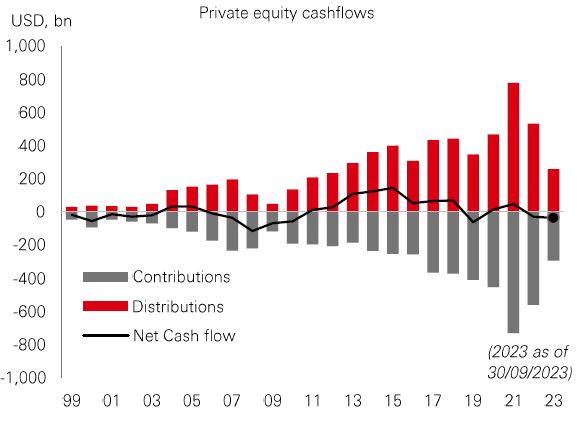
Past performance does not predict future returns. The level of yield is not guaranteed and may rise or fall in the future. This information shouldn't be considered as a recommendation to buy or sell specific sector/stocks mentioned. Any views expressed were held at the time of preparation and are subject to change without notice. Source: HSBC Asset Management. Macrobond, Bloomberg, Datastream. Data as at 11.00am UK time 09 August 2024.
| Last week |
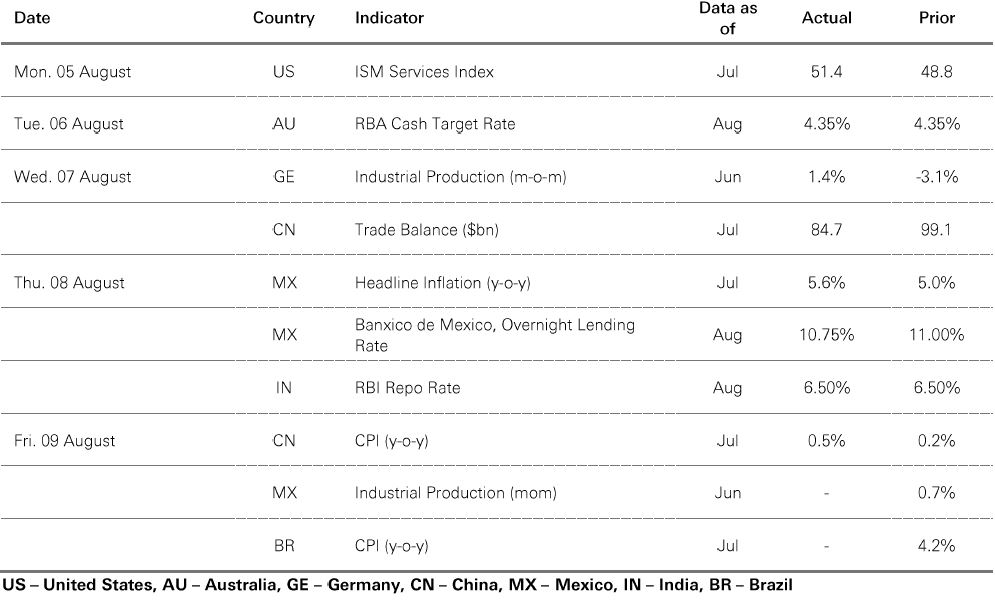
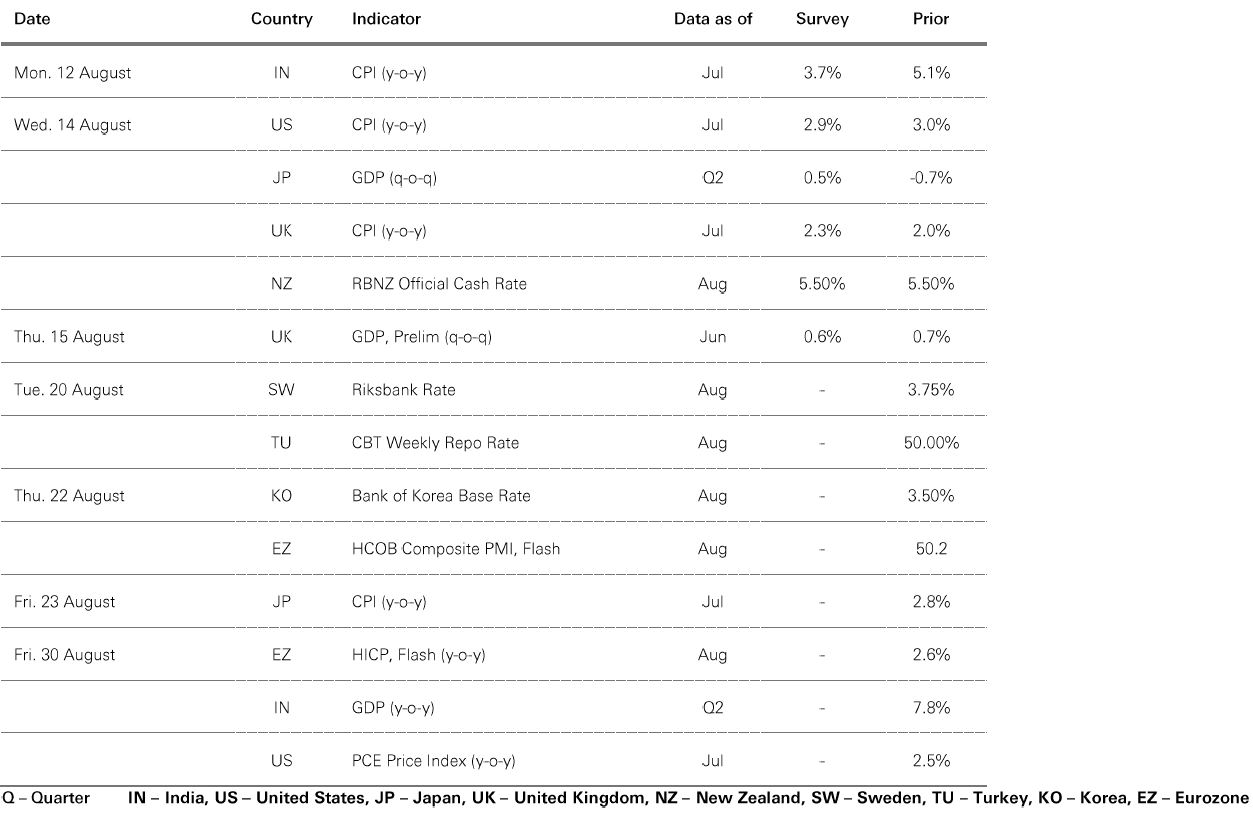
Source: HSBC Asset Management. Data as at 11.00am UK time 12 August 2024. This information shouldn't be considered as a recommendation to buy or sell specific sector/stocks mentioned. Any views expressed were held at the time of preparation and are subject to change without notice.
Global risk assets continued to sell off sharply early in the last week as July’s correction in US tech stocks evolved into a broader market rout driven by signs of faster than expected cooling in the US economy. An unwinding of yen-funded carry trades – triggered by the previous week’s surprise rate hike by the Bank of Japan – added to the volatility. The worst of the impact was felt in equities, but the S&P 500 and small-cap Russell 2000 both regained composure later in the last week. Major EM indices were more resilient, with China’s Shanghai Composite index finishing slightly lower, India’s Sensex flat, and Brazil’s Ibovespa staging a strong relief rally. In core bonds, US Treasury yields arrested recent falls to finish higher. In commodities, oil prices rose on growing supply concerns in the Middle East. Gold recovered from a mild correction early in the last week to finish with a modest decline.
Related Insights

Despite media headlines about the US election, investors should focus on earnings, rates...[1 Aug]

As expected, the FOMC kept rates unchanged at the July meeting. The Fed funds rate remains...[1 Aug]


Market expectations for Fed rate cuts have been on a roller-coaster ride, swinging from too...[23 May]
This document or video is prepared by The Hongkong and Shanghai Banking Corporation Limited (‘HBAP’), 1 Queen’s Road Central, Hong Kong. HBAP is incorporated in Hong Kong and is part of the HSBC Group. This document or video is distributed and/or made available by HSBC Bank Canada (including one or more of its subsidiaries HSBC Investment Funds (Canada) Inc. (“HIFC”), HSBC Private Investment Counsel (Canada) Inc. (“HPIC”) and HSBC InvestDirect division of HSBC Securities (Canada) Inc. (“HIDC”)), HSBC Bank (China) Company Limited, HSBC Continental Europe, HBAP, HSBC Bank (Singapore) Limited, HSBC Bank Middle East Limited (UAE), HSBC UK Bank Plc, HSBC Bank Malaysia Berhad (198401015221 (127776-V))/HSBC Amanah Malaysia Berhad (20080100642 1 (807705-X)), HSBC Bank (Taiwan) Limited, HSBC Bank plc, Jersey Branch, HSBC Bank plc, Guernsey Branch, HSBC Bank plc in the Isle of Man, HSBC Continental Europe, Greece, The Hongkong and Shanghai Banking Corporation Limited, India (HSBC India), HSBC Bank (Vietnam) Limited, PT Bank HSBC Indonesia (HBID), HSBC Bank (Uruguay) S.A. (HSBC Uruguay is authorised and oversought by Banco Central del Uruguay), HBAP Sri Lanka Branch, The Hongkong and Shanghai Banking Corporation Limited – Philippine Branch, and HSBC FinTech Services (Shanghai) Company Limited (collectively, the “Distributors”) to their respective clients. This document or video is for general circulation and information purposes only.
The contents of this document or video may not be reproduced or further distributed to any person or entity, whether in whole or in part, for any purpose. This document or video must not be distributed in any jurisdiction where its distribution is unlawful. All non-authorised reproduction or use of this document or video will be the responsibility of the user and may lead to legal proceedings. The material contained in this document or video is for general information purposes only and does not constitute investment research or advice or a recommendation to buy or sell investments. Some of the statements contained in this document or video may be considered forward looking statements which provide current expectations or forecasts of future events. Such forward looking statements are not guarantees of future performance or events and involve risks and uncertainties. Actual results may differ materially from those described in such forward-looking statements as a result of various factors. HBAP and the Distributors do not undertake any obligation to update the forward-looking statements contained herein, or to update the reasons why actual results could differ from those projected in the forward-looking statements. This document or video has no contractual value and is not by any means intended as a solicitation, nor a recommendation for the purchase or sale of any financial instrument in any jurisdiction in which such an offer is not lawful. The views and opinions expressed are based on the HSBC Global Investment Committee at the time of preparation, and are subject to change at any time. These views may not necessarily indicate HSBC Asset Management‘s current portfolios’ composition. Individual portfolios managed by HSBC Asset Management primarily reflect individual clients’ objectives, risk preferences, time horizon, and market liquidity.
The value of investments and the income from them can go down as well as up and investors may not get back the amount originally invested. Past performance contained in this document or video is not a reliable indicator of future performance whilst any forecasts, projections and simulations contained herein should not be relied upon as an indication of future results. Where overseas investments are held the rate of currency exchange may cause the value of such investments to go down as well as up. Investments in emerging markets are by their nature higher risk and potentially more volatile than those inherent in some established markets. Economies in emerging markets generally are heavily dependent upon international trade and, accordingly, have been and may continue to be affected adversely by trade barriers, exchange controls, managed adjustments in relative currency values and other protectionist measures imposed or negotiated by the countries with which they trade. These economies also have been and may continue to be affected adversely by economic conditions in the countries in which they trade. Investments are subject to market risks, read all investment related documents carefully.
This document or video provides a high level overview of the recent economic environment and has been prepared for information purposes only. The views presented are those of HBAP and are based on HBAP’s global views and may not necessarily align with the Distributors’ local views. It has not been prepared in accordance with legal requirements designed to promote the independence of investment research and is not subject to any prohibition on dealing ahead of its dissemination. It is not intended to provide and should not be relied on for accounting, legal or tax advice. Before you make any investment decision, you may wish to consult an independent financial adviser. In the event that you choose not to seek advice from a financial adviser, you should carefully consider whether the investment product is suitable for you. You are advised to obtain appropriate professional advice where necessary.
The accuracy and/or completeness of any third party information obtained from sources which we believe to be reliable might have not been independently verified, hence Customer must seek from several sources prior to making investment decision.
Important Information about HSBC Global Asset Management (Canada) Limited (“AMCA”)
HSBC Asset Management is a group of companies, including AMCA, that are engaged in investment advisory and fund management activities, which are ultimately owned by HSBC Holdings plc. AMCA is a wholly owned subsidiary of, but separate entity from, HSBC Bank Canada.
Important Information about HSBC Investment Funds (Canada) Inc. (“HIFC”)
HIFC is the principal distributor of the HSBC Mutual Funds and offers the HSBC Mutual Funds and/or the HSBC Pooled Funds through the HSBC World Selection® Portfolio service. HIFC is a subsidiary of AMCA, and indirect subsidiary of HSBC Bank Canada, and provides its products and services in all provinces of Canada except Prince Edward Island. Mutual fund investments are subject to risks. Please read the Fund Facts before investing.
®World Selection is a registered trademark of HSBC Group Management Services Limited.
Important Information about HSBC Private Investment Counsel (Canada) Inc. (“HPIC”)
HPIC is a direct subsidiary of HSBC Bank Canada and provides services in all provinces of Canada except Prince Edward Island. The Private Investment Counsel service is a discretionary portfolio management service offered by HPIC. Under this discretionary service, assets of participating clients will be invested by HPIC or its delegated portfolio manager, AMCA, in securities, including but not limited to, stocks, bonds, mutual funds, pooled funds and derivatives. The value of an investment in or purchased as part of the Private Investment Counsel service may change frequently and past performance may not be repeated.
Important Information about HSBC InvestDirect (“HIDC”)
HIDC is a division of HSBC Securities (Canada) Inc., a direct subsidiary of, but separate entity from, HSBC Bank Canada. HIDC is an order execution only service. HIDC will not conduct suitability assessments of client account holdings or of the orders submitted by clients or from anyone authorized to trade on the client’s behalf. Clients have the sole responsibility for their investment decisions and securities transactions.
Important Information about the Hongkong and Shanghai Banking Corporation Limited, India (“HSBC India”)
HSBC India is a branch of The Hongkong and Shanghai Banking Corporation Limited. HSBC India is a distributor of mutual funds and referrer of investment products from third party entities registered and regulated in India. HSBC India does not distribute investment products to those persons who are either the citizens or residents of United States of America (USA), Canada, Australia or New Zealand or any other jurisdiction where such distribution would be contrary to law or regulation.
The following statement is only applicable to HSBC Bank (Taiwan) Limited with regard to how the publication is distributed to its customers: HSBC Bank (Taiwan) Limited (“the Bank”) shall fulfill the fiduciary duty act as a reasonable person once in exercising offering/conducting ordinary care in offering trust services/ business. However, the Bank disclaims any guarantee on the management or operation performance of the trust business.
The following statement is only applicable to PT Bank HSBC Indonesia (“HBID”): PT Bank HSBC Indonesia (“HBID”) is licensed and supervised by Indonesia Financial Services Authority (“OJK”). Customer must understand that historical performance does not guarantee future performance. Investment product that are offered in HBID is third party products, HBID is a selling agent for third party product such as Mutual Fund and Bonds. HBID and HSBC Group (HSBC Holdings Plc and its subsidiaries and associates company or any of its branches) does not guarantee the underlying investment, principal or return on customer investment. Investment in Mutual Funds and Bonds is not covered by the deposit insurance program of the Indonesian Deposit Insurance Corporation (LPS).
THE CONTENTS OF THIS DOCUMENT OR VIDEO HAVE NOT BEEN REVIEWED BY ANY REGULATORY AUTHORITY IN HONG KONG OR ANY OTHER JURISDICTION.
YOU ARE ADVISED TO EXERCISE CAUTION IN RELATION TO THE INVESTMENT AND THIS DOCUMENT OR VIDEO. IF YOU ARE IN DOUBT ABOUT ANY OF THE CONTENTS OF THIS DOCUMENT OR VIDEO, YOU SHOULD OBTAIN INDEPENDENT PROFESSIONAL ADVICE.
© Copyright 2024. The Hongkong and Shanghai Banking Corporation Limited, ALL RIGHTS RESERVED.
No part of this document or video may be reproduced, stored in a retrieval system, or transmitted, on any form or by any means, electronic, mechanical, photocopying, recording or otherwise, without the prior written permission of The Hongkong and Shanghai Banking Corporation Limited.
Important information on sustainable investing
“Sustainable investments” include investment approaches or instruments which consider environmental, social, governance and/or other sustainability factors (collectively, “sustainability”) to varying degrees. Certain instruments we include within this category may be in the process of changing to deliver sustainability outcomes.
There is no guarantee that sustainable investments will produce returns similar to those which don’t consider these factors. Sustainable investments may diverge from traditional market benchmarks.
In addition, there is no standard definition of, or measurement criteria for sustainable investments, or the impact of sustainable investments (“sustainability impact”). Sustainable investment and sustainability impact measurement criteria are (a) highly subjective and (b) may vary significantly across and within sectors.
HSBC may rely on measurement criteria devised and/or reported by third party providers or issuers. HSBC does not always conduct its own specific due diligence in relation to measurement criteria. There is no guarantee: (a) that the nature of the sustainability impact or measurement criteria of an investment will be aligned with any particular investor’s sustainability goals; or (b) that the stated level or target level of sustainability impact will be achieved.
Sustainable investing is an evolving area and new regulations may come into effect which may affect how an investment is categorised or labelled. An investment which is considered to fulfil sustainable criteria today may not meet those criteria at some point in the future.